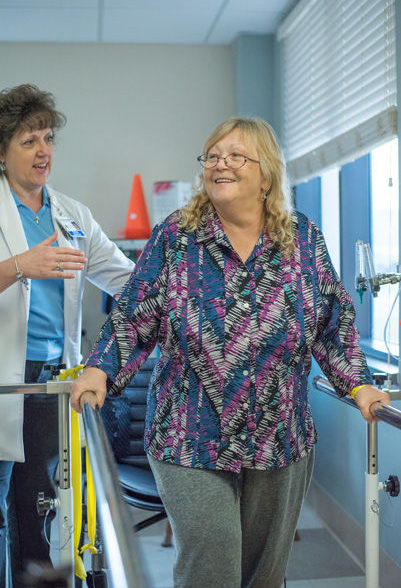
Groundbreaking heart procedures, advanced cancer drugs and new high-tech imaging devices tend to steal the health news headlines these days but the U.S. National Library of Medicine at the National Institutes of Health suggests an equally important story can be found in the hospital re-admission rates of seniors
The Centers for Medicare and Medicaid Services illustrates the point: “Nearly one in five Medicare patients who are discharged from a hospital – approximately 2.6 million seniors every year – are re-admitted within 30 days at a cost of over $26 billion.”
Moreover, says NIH, these “poor handoffs” of older Americans dramatically increase the odds of serious breakdowns in care, often with fatal consequences.
To combat this growing problem, NIH strongly endorses transitional care units or TCUs that offer “a broad range of services and environments designed to promote the safe and timely re-integration” of those seniors back into their normal lives.
Those services include physical and speech therapy, medication management, cognitive and executive function improvements and, when necessary, helping to arrange extended coverage by Medicare and insurance companies.
The first skilled nursing transitional facility in Sebastian is at the Sebastian River Medical Center. To learn more about how it operates, Vero Beach 32963 met with the facility’s administrator, Gloria Tausch; the center’s director of nursing, Virginia Currier; its director of rehabilitation, Bernadette Haugh, and Cherie Kalogris, a patient who, after suffering a traumatic fall and undergoing major surgery, is now ready to return home.
Q: Am I correct in thinking seniors make up the bulk of the patients you see at the TCU?
Tausch: That’s correct. The majority of our patients are over 65. Most of them are recovering from knee replacements, hip replacements, COPD and respiratory distress. We also get cardiac and stroke patients. To get them strong enough that they can go back home after they’ve been in the hospital for a while, they may need to learn how to walk again or how to take care of themselves again. They have to build up their strength.
Currier: People can get “de-conditioned” very quickly. If they come in for, say, pneumonia and they were previously independent at home, if they spend four or five days in a bed upstairs with IV antibiotics, they can become de-conditioned and they’re not strong enough to return home, so they’ll come here.
Q: Do you work with the families as well as the patient?
Haugh: The families are an absolutely integral part of the healing process. We invite them to participate so that they can understand what the patient’s needs are and everybody can become comfortable as they transition home.
Tausch: We also teach them … like if there’s a brace that they have to put on, we can have the family involved in that. If there’s catheter care they’ll need to learn, it’s an educational process. We ask (family members) to come to therapy so they can see how they can help with the transition. And, we review their situation at home to see if they need any special equipment.
Q: As the only TCU patient in the room, does all of that ring true?
Kalogris: Absolutely. I’ve been here a long time because of the severity of my injury and they have treated me with dignity and respect. The caring is unbelievable. That’s not a Pollyanna thing because I am not that type of lady. I’d lost my independence with this particular accident and they all nurtured me through it. It’s really been an incredible experience.
Q: I see some patients walking the hallways but is that really “real world” rehab?
Currier: We do take them outside for uneven surfaces because – face it – when they go home, they’re not staying inside. They’re going to parking lots and they’re going on sidewalks and they’re getting in and out of their cars and those are uneven surfaces.
Kalogris: I’ve gone outside several times to work with the ramps and things like that out in the parking lot. You have to be able to control the wheelchair so all that is incorporated.
Q: Some insurers have limits on how much transitional care they’ll pay for. Is that a frequent problem here?
Tausch: We sometimes have had to extend and help (patients) appeal because Medicare or their managed care cuts them off, and we feel they’re really not safe (to return home) so we’ll help them appeal and help with the paperwork.
Haugh: As therapists, we look at what the patient’s needs are for going home safely and we make our decisions based on that clinical need.
Q: The cynic in me says that once medicare started cutting hospital payments based on patient re-admission rates, programs like this have become more and more common as a result, but my guess is it’s still gratifying work. What do you think?
Tausch: I think we see miracles happen here. We see people come in so debilitated – and they can get very frustrated – then all of the sudden, we see them rise to the challenge. They do things they didn’t think they could do. We have people who haven’t walked at home for months and now they’re walking. It’s just a wonderful feeling.
Currier: When patients return home successfully and we’ve helped them so they can succeed at being at home, it’s going to prevent them from ending up back in the ER, and we just love that.
The Transitional Care Unit at Sebastian River Medical Center can be reached by phone at 772-581-2004.



